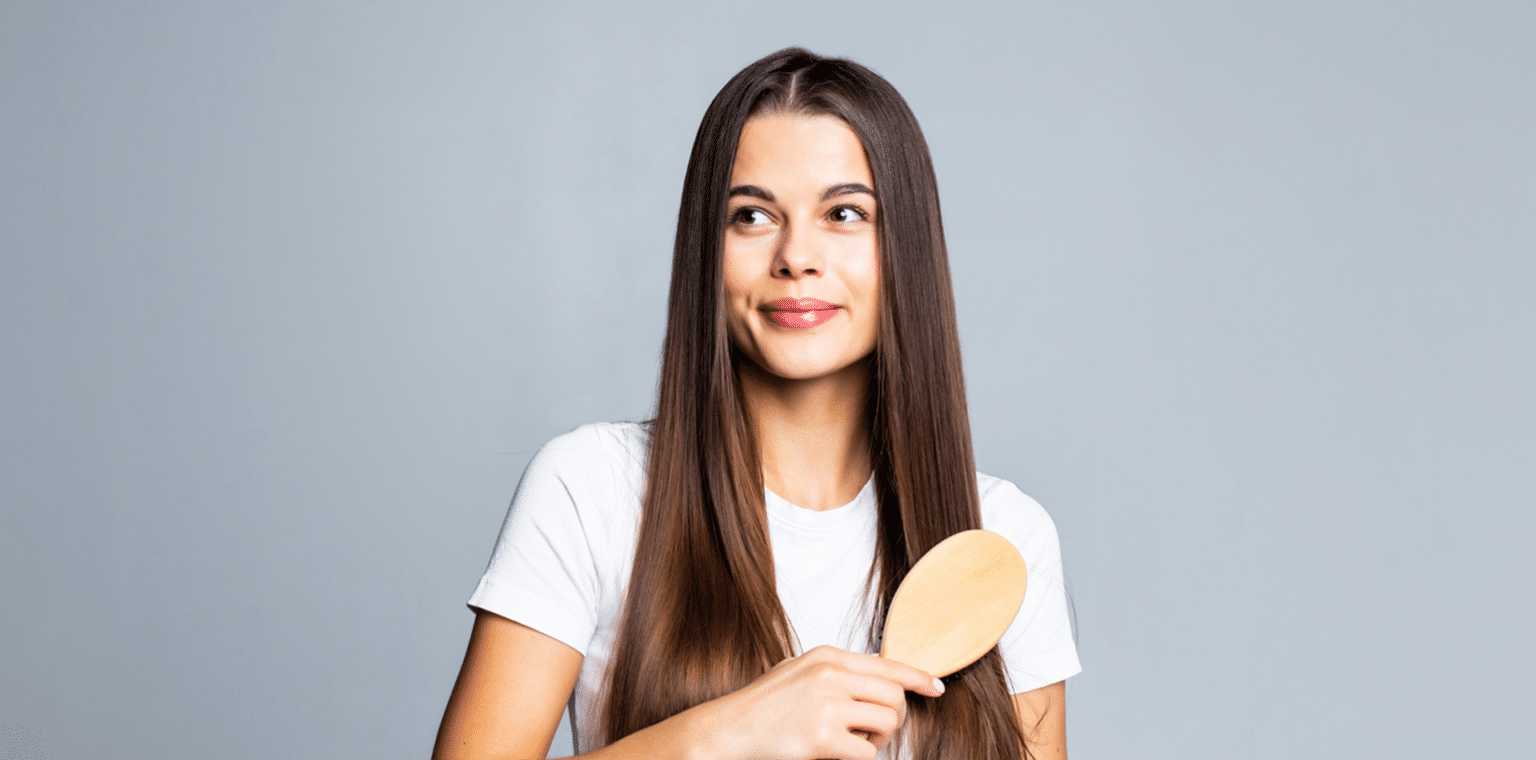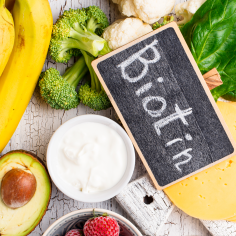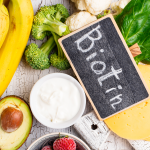The majority of the time, your hair health can give an insight of what your diet looks like (even minor issues like Biotin defieciencies). If it’s lush, smooth and hydrated, then you’re good to go! But if it’s dry, flaky and with brittle ends – you have to find a solution!
Certain nutrients help and contribute more towards the overall improvement of our hair health. While some nutrient deficiencies are known to impair and deteriorate hair health. Lets understand how these nutrients impact our hair health and what role they play in it.
Vitamin B-Complex
B-Complex Vitamins help to create red blood cells which carry oxygen and nutrients to the scalp and hair follicles. Thereby, they promote overall hair health by creating a nourishing atmosphere.
.
However when it comes to hair health out of all the B-Complex vitamins the most profound Vitamin contributing to our hair health is Vitamin B7 also known as Biotin.
Biotin helps by making hair thicker, stronger and shinier. Certain research also shows that biotin supplementation can help and improve hair regrowth in those who have been suffering from hair fall, alopecia or hair loss.
Studies also suggest that those suffering from hair loss can get relief by opting for Biotin supplementation. It also helps those suffering from hair thinning.
The daily recommended allowance for Biotin is not officially recommended by the FDA. However, on an average 2-5 mcg of Biotin helps to maintain hair health. In cases of hair fall and hair loss this number can go up to 30 mcg -100 mcg or even more depending on case to case.
Biotin and the other B-Complex Vitamins are water-soluble and due to the same reason their need increases even more as they are easily flushed out of our system. Hence its important to replenish its stores and therefore taking them in adequate quantity via diet or supplements is important as they cannot be stored in our body.
Food Sources For Vitamin B- Nuts, Avocados, Leafy Vegetables, etc.
There are times when the hair fall or hair loss isn’t just due to lack of Biotin but due to the other vital nutrients which are essential for hair health.
Deficiencies like Vitamin A, Vitamin C,Vitamin E, B-complex, Iron, and Zinc can also lead to hair problems. Let’s understand how each of them directly or indirectly influences our hair health.
Vitamin A
Vitamin A is an antioxidant mainly known for our eye health, however it also contributes to our hair health. Vitamin A is required for new growing cells. Hair is the fastest growing tissue and hence needs good supply of Vitamin A.
It not only aids in hair growth but also helps to keep the hair follicles healthy by providing enough moisture. That further helps to prevent breakdown. It regulates the production of sebum in the skin glands to produce sebum and that keeps the scalp healthy and well moisturised
The daily recommended allowance for Vitamin A is 1000 mcg and rich sources like the Papaya, Carrots, Spinach, Pumpkin can be opted for the same.
Vitamin C
Vitamin C is a very powerful antioxidant and plays a vital role for our hair health. It prevents and fights free radicals which damage collagen in our body.
This collagen further helps to promote the protein called keratin. Keratin is a protective protein which helps to form the outer layer (epidermis) of our skin, hair and nails. It is basically the structural building block of our hair. It also helps to also support our skin and heal wounds and keep hair, nails and skin health.
Also, Vitamin C helps in improving the absorption of iron due to the acidic medium it provides. In turn, it helps to improve overall hemoglobin levels. This specially helps if the hair fall is due to low iron or hemoglobin.
The Recommended Dietary Allowance for Vitamin C is 80 mcg and usually we can find and fulfill the Vitamin C from our daily diet and its deficiency isn’t very common. However, you can opt for rich sources like guava, amla, citrus fruits for additional benefits and to fulfill the daily requirements.
Vitamin E
Vitamin E is a strong fat-soluble antioxidant that impacts our hair health. It’s essential for not only healthy skin but also for healthy scalp. Vitamin E supports the scalp and gives us hair a strong base to grow from by reducing oxidative stress and preserving the protective lipid layer.
It stimulates hair growth and reduces split ends. The antioxidant properties of Vitamin E helps to reduce and prevent the wear and tear for scalp and also reduces the levels of oxidative stress.
It gives your hair that extra shine and makes it voluminous. Vitamin E also prevents premature greying and adds a natural lustre to your hair. It repairs damaged hair follicles, resulting in stronger roots that make it one of the best vitamins for hair.
A study also showed that vitamin E supplements improved hair growth in people with hair loss. It’s thought that the vitamin’s antioxidant properties helped reduce oxidative stress in the scalp. Oxidative stress has been linked with hair loss. Hence it also repairs damaged hair follicles, makes the hair roots stronger.
Food Sources For Vitamin E – Sunflower Seeds, Spinach, Avocado, Almonds, etc.
Iron (along with Biotin)
Iron is an essential mineral for many functions. However, when it comes to our hair health it plays a vital role for good hair and its maintenance. It ensures sufficient oxygen is being regulated to the scalp along with other nutrients along with it. It provides nourishment to the hair follicles and hence Iron deficiency. Iron deficiency is the most common nutrient deficiency in the world also known as anemia. It can cause hair fall/ hair loss/weak hair, especially in women, daily 45 mg of iron will help to avoid these deficiencies.
The Low iron stores (ferritin) increases the rate of hair fall, especially in non-menopausal women. Iron also helps improve hair texture and reduces dullness by increasing the flow of oxygen and nutrients to the hair roots and scalp.
Zinc
Zinc is an an important mineral. It is a strong anti-inflammatory agent and contributes to immune function, DNA synthesis, and wound healing.
Deficiency can be one of the contributing factors for poor hair health. Studies found that Zinc deficiency leads to changes in the protein structure of hair follicles leading to weakening of their structural integrity. This means new hairs will fall off quicker than they should.
To increase the hair follicle growth, Zinc helps stabilize the cell membranes and helps remove oxidative radicals to promote the integrity of hair follicle cells.
Hence a diet comprising of good and healthy sources of zinc will help to fulfill the daily requirements of 40 mg, which is the recommended daily allowance and also ensures good hair health.
Selenium
Selenium is also an antioxidant and has immuno-modulatory properties. It helps to clear toxins which have an adverse effect on the hair growth and can cause hindrance in our hair health inhibit.
Selenium is also involved in the formation of the new hair and it regulates the thyroid hormones as well. These hormones indirectly affect our other systems functioning as well. These hormones and minerals go hand in hand which help in having healthy hair and deficiency of one can cause severe hair loss.
Food sources like nuts and seeds are rich sources of selenium, which will help to make our diet be adequate in the same and decrease chances of any deficiency.
Omega-3 (along with Biotin)
Omega is a rich class of fatty acids which is anti-inflammatory in nature, it fights and decreases the inflammation in our body. In terms of hair health its plays a very important role. It provides essential nutrients to the hair follicles and also keeps it healthy by providing the needed healthy fats.
It helps to manage hair loss as it reduces inflammation caused by factors like stress, heavy medications and poor sleep patterns/lifestyle etc. Studies also show it can help to improve the overall hair health and increase the hair thickness and reduces brittleness of the hair. Food sources like flax seeds, fish(salmon majorly),Canola are sources which can help us cover up for our daily dose for omega in our diet.
DHT Blockers (along with Biotin)
DHT Blocker may sound like a huge word but it’s very simple. Basically, DHT is dihydrotestosterone which is a male sex hormone. This hormone functions by binding to the receptors in our scalp. Gradually, this causes hair loss and also shrinks the follicle size which reduces the new hair growth as well.
This is generally found in male pattern baldness also known as androgenic alopecia. So DHT Blocker helps to block this activity of the hormone which helps further to improve hair growth and also stop the current hair loss.
To get all of the above nutrients in the diet is not easy considering the diet culture we have today, the bioavailability of the nutrients today in our food, the stress and lifestyle that we follow. However we can get all of the above on a daily basis and fortunately for it we have OZiva Plant Based Biotin and OZiva Hair Vitamins which comes to our rescue. It has plant based extracts of Biotin and the goodness of Vitamin A, C, D, E, B-complex, Iron, Zinc & Omega-3 respectively.
They help in hair nourishment, hair growth, improved hair quality and also prevents follicle shrinking and controls hair fall with the help of DHT Blockers present in it.
Conclusion
Along with the supplementation it’s also recommended to follow a healthy diet, regular physical activity and have a healthy lifestyle along with it. That forms the base for our overall health and not just hair health. Along with it some additional physical activity is like a cherry on the top which helps to improve blood circulation and also helps to improve the nourishment to the scalp which is necessary for hair growth and overall hair health.
Last modified: August 18, 2023





